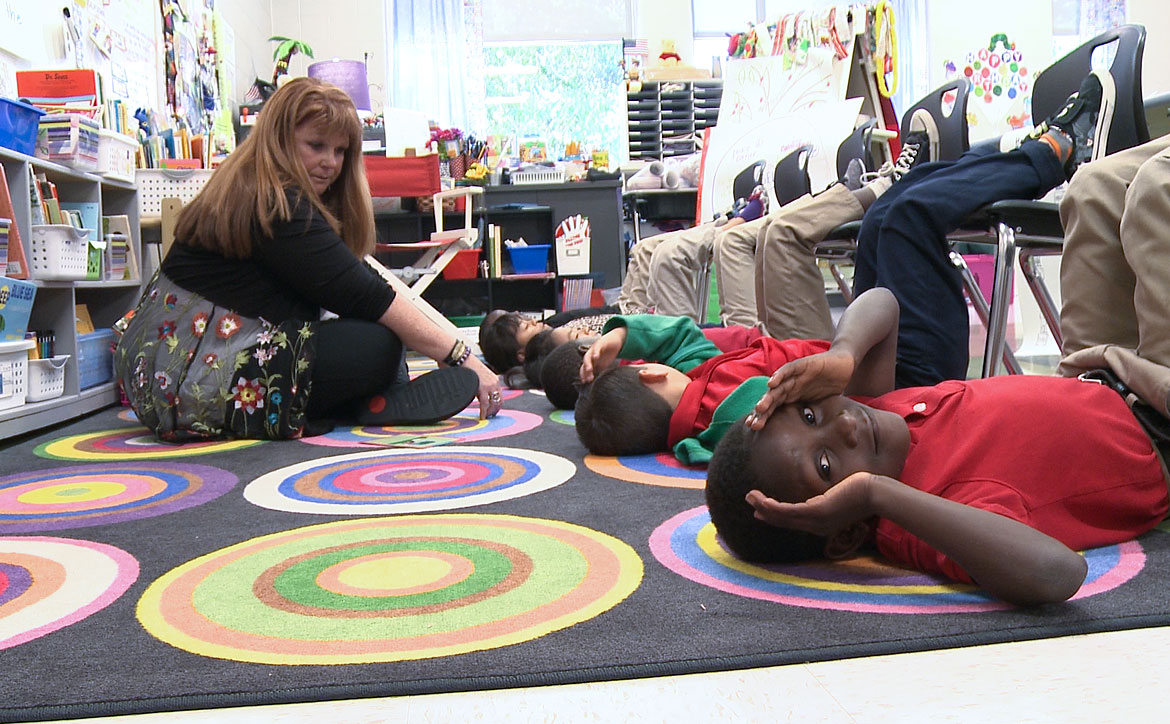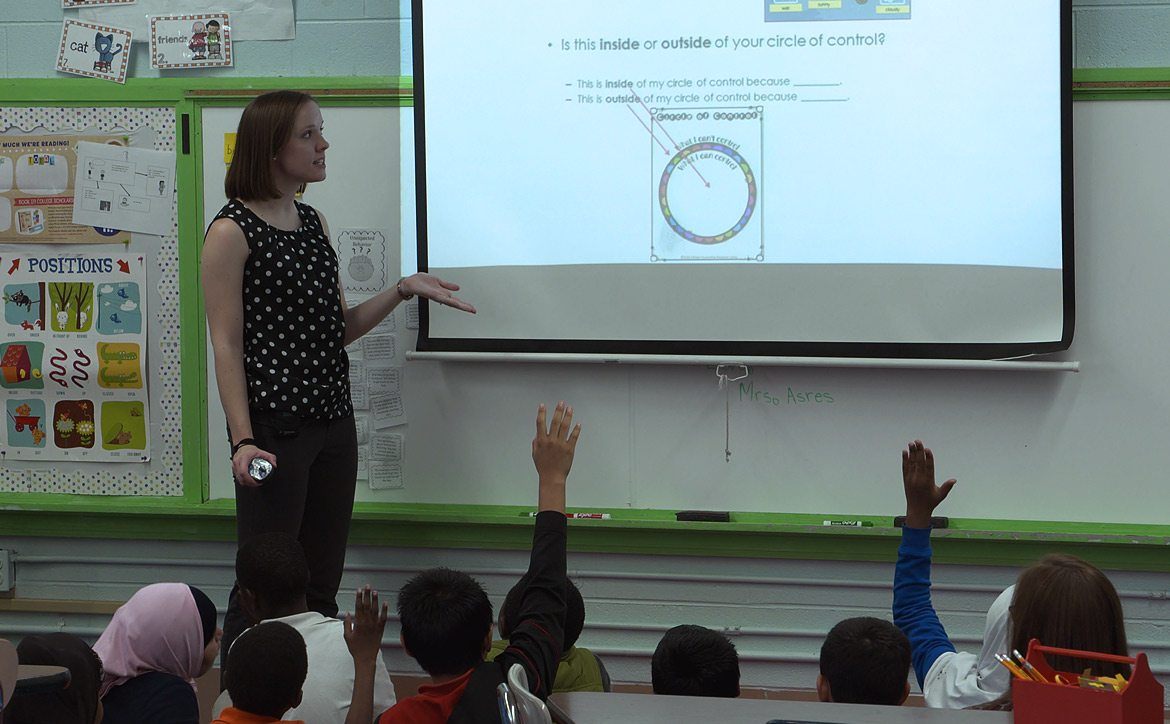The changing face of Metro Nashville Public Schools
Metro Nashville Public Schools (MNPS) is the second-largest school district in Tennessee, with about 87,000 students. The district’s social and emotional learning journey began with the creation of an SEL Department in 2011. Today, every educator receives SEL professional development, and the district is piloting tools to help teachers and administrators measure the efficacy of their SEL instructional practices. The hallmark of the district’s efforts are grade-level SEL standards, captured as a series of “I Can” statements for students.
In the past decade, the number of English Learners in Metro Nashville Public Schools has grown significantly. More than 1,000 new English Learners enroll in the district annually. Although not all are English Learners, a near-third of MNPS students speak a language other than English at home; in total, 120 languages are spoken in MNPS schools.
English Learners


Spoken at Home


Languages Spoken


Metro Nashville’s English Learners: where language and social and emotional learning instruction meet
Metro Nashville’s English Learner educators have a challenging balancing act. They must differentiate instruction to students with a broad range of native languages and varying levels of literacy in those primary languages. To help deliver accessible-yet-rigorous content to this diverse population of learners, the school district has developed a number of instructional models. When an English Learner student enters Metro Nashville Public Schools, he or she takes a proficiency placement test that includes reading, writing, speaking and listening. Based on the student’s proficiency level, he or she is then placed into the appropriate service model for instruction. English Learner instruction takes place in schools and classrooms all across the district, and is guided by the Office of English Learners. Teachers of English Learners draw on support from this office, participating in professional development and accessing resources that help them grow their students’ language acquisition and fluency. These resources fall into a few key categories: classroom support; academic speaking and vocabulary skills within math, science and social studies; and social, emotional and cultural supports.
Student countries of origin represented in the Metro Nashville Public Schools SIFE program
Within Metro Nashville’s significant population of immigrants and English Learners, one category of students has some of the greatest instructional – and social and emotional – needs. These Students with Interrupted Formal Education, or SIFE, have limited or no experience with education in their home countries and, in nearly all cases, have experienced trauma. They come to Nashville from nations known for brutal conflicts and refugee migrations, like Syria, Somalia and the Democratic Republic of Congo. Along with their families, these students help make Nashville home to the fastest-growing immigrant population in the country and represent the latest wave of immigrants in a city that has resettled refugees since the 1970s (often against the protests of Tennessee lawmakers). SIFE teachers work with their students in separate, SIFE-only classrooms in three elementary, two middle and three high school sites around the city, closest to the neighborhoods where resettlement agencies send families.
Beginning two years ago, SIFE program coordinators and teachers began to see troubling student behaviors, and sought to educate themselves about the effects of trauma on young learners. Those conversations, with experts both in trauma-informed learning and in the cultures and languages of their students, began a journey to integrate and emphasize social and emotional learning instruction and skills in all elements of the SIFE classroom experience.
What we learned from Metro Nashville Public Schools
Growing Students’ Self-Management Skills

Nashville’s SIFE educators work to develop students’ SEL competencies, recognizing these skills and attributes are all important and interconnected. In particular, they elevate the competency of self-management, or the ability to name and regulate one’s emotions, thoughts and behaviors in different academic and social situations. For students overcoming trauma or who have had little exposure to the sort of social and emotional learning more common in American preschool and early elementary environments, lack of self-management skills and tools can be among the greatest challenges to positive classroom participation. SIFE teachers explain how their commitment to growing students’ self-management skills shapes different elements of their instructional practices. These teachers create physical spaces in their classrooms, like “Peace Corners,” for students to address strong feelings when they arise. And they deliver direct instruction on SEL topics, such as “Circles of Control,” that help students grow their understanding of the behaviors that can help them effectively manage those feelings.
Social and Emotional Learning and Language Acquisition

Students with Interrupted Formal Education are working hard every day to develop their English language skills, yet many are just beginning their journey to fluency. Speaking, reading and other English skills are critical to SEL instruction, but when teaching students who are new arrivals to the school district, SIFE teachers do not have the luxury of treating English fluency as a prerequisite for Social and Emotional Learning. Instead, they incorporate visual and tactile supports in all of their SEL instruction, to give students multiple ways of accessing key concepts like “perseverance.” The experiences of SIFE students and teachers in Metro Nashville illustrate the ways in which building English vocabulary and building SEL skills, particularly the ability to name and recognize emotions, are integral to one another.
Teacher Practice Beyond the Classroom Lesson

Great teaching has never started or ended with the classroom lesson, and Metro Nashville’s SIFE educators really embody this maxim. Given students’ limited English proficiency and literacy, instruction in these classrooms can appear simple or lacking rigor. This belies the extensive amount of planning and scaffolding that undergirds each lesson. SIFE teachers meet daily to plan lessons, monitor each student’s progress and identify the appropriate instructional strategies. And for each lesson that integrates SEL and academics, SIFE teachers are triangulating among 1) the grade-level academic standards to which they aim to introduce their students; 2) the district’s grade-level SEL standards; and 3) the qualitative and quantitative formative data they are constantly gathering about students’ English language proficiency and academic progress.
“Part of the joy of providing space for social and emotional learning is seeing students learn how to activate these reflective parts of the brain, these conflict management skills.”
Try this at home: tools from Metro Nashville for teachers and administrators
Although Students with Interrupted Formal Education are a unique population, the practices of these Metro Nashville educators have broader application for classrooms and for teachers of English Learners and students overcoming trauma. The following tools can be adapted and used in a variety of school and classroom environments.
The Metro Nashville Social Emotional Learning Walkthrough Rubric
This tool, created by Metro Nashville in a collaborative project with the Anchorage School District, is used by the district SEL team to guide observations and feedback conversations with teachers and principals. It may be adapted for use by school administrators, or for self-reflection by teachers and school leadership teams.
The Metro Nashville English Learners Curriculum Circle
This framework, developed by the Office of English Learners, helps educators assess and develop quality curricular materials and create lesson plans that address the key practices for supporting students in their mastery of the English Language and grade-level academic content.
The Metro Nashville High Quality Instruction for English Learners Guidance
This guidance document accompanies the EL Curriculum Circle framework, illustrating the elements of high-quality instruction and providing a checklist of classroom practices that can be adapted for use by teachers for self-assessment or for use by teacher coaches during classroom observations.
Additional Resources
In addition to the stories of SIFE teachers featured here, Metro Nashville Public Schools’ SEL journey has been well-documented. Teachers, administrators and policymakers can explore these case studies, videos and reports to learn how MNPS connected professional learning, curriculum and assessment, and developed a high-functioning and continuously improving “culture of social and emotional learning.”
Key Implementation Insights from the Collaborating Districts Initiative
This report, from the Collaborative for Academic, Social, and Emotional Learning, features lessons both from Metro Nashville Public Schools and the nine other districts participating in a multi-year network focused on quality implementation of SEL.
View Resource
Collaborating Districts Initiative Nashville Featured Webpage
Also from CASEL, this website features further detail on Metro Nashville’s efforts to implement SEL, highlighting the district’s curricular and professional learning approaches and offering video and tools.
View Resource
Case Study of SEL in Metro Nashville Public Schools
This brief Bridgespan case study offers insights into the strategies behind SEL in Metro Nashville.
View Resource
Guide to Supporting Students with Interrupted Formal Education
For a greater understanding of, and more ideas about how to support, this unique population of Students with Interrupted Formal Education, Colorín Colorado (a partnership of WETA, the American Federation of Teachers and the National Education Association) offers an extensive collection of recommendations and further reading.
View Resource










